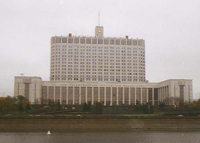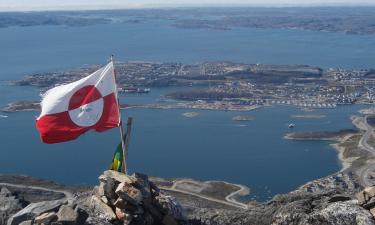Russian government is dividing posts
Until very recently everybody thought that the First Vice-Premier Sergey Ivanov would take personal responsibility for the fate of the reforms in the shipbuilding becoming the Chairman of Board of Directors of the United Shipbuilding Corporation (OSK). First illusions disappeared when Sergey Ivanov allegedly gave away this position to the Minister of Defense Anatoly Serdyukov. That would have been the second position of a Chairman of the Board for Serdyukov. He already heads the board of the Volgograd based company Chimrom (Chemical Industry), where the state has a stock.

However, a bit later the President of Russia Vladimir Putin by a special decree appointed Vice-Premier Sergey Naryshkin the Chairman of the Board of OSK. This is a final decision publicly confirmed by Naryshkin and later by Ivanov during his visit to Ivanovo. Re-appointments take place not only on the top level. Serious staff reshuffles are taking place in the northern daughter of OSK. Both Sevmash and Zvezdochka are going to have new leaders and respectively the whole managerial team.
The regular meeting of the Governmental Commission on Ensuring the Integration of the Enterprises of the Shipbuilding Complex headed by the Minister of the Industry Victor Khristenko recently took place in Moscow. The meeting decided that the Board of Directors of OSK will consist of eleven members, whereas the Boards of the sub-holdings (Western, Northern and the Far East Centers of Shipbuilding and Ship Repair) – of seven persons. The commission approved draft articles of association of OSK and discussed a number of principal organizational points.
These events nearly coincided with the announced decision of the United Industrial Corporation (OPK) to finalize the unification of the two leading shipyards of Russia, Severnaya Verf and Baltic Shipyard, by 2010-2011. Russian government agrees with many proposals. Sergey Ivanov publicly promised to support the industry and voiced the plans of the government to participate in the being created private holding of the manufacturers of machine-tools. The capacity of the unified shipyard which will be formed on the basis of Severnaya Verf will be 500 thousand tons of deadweight a year. The total sum of the investments into the project amounts to 13,7 billion rubles. Financing will include credits.
While the reforms in the shipbuilding got an irreversible pace, Sergey Ivanov picked up the next branch for the reforms. His visit to Ivanovo was dedicated to the expected reforms in the sector of machine-tools. The branch is in a state of system crises. The growing industry of Russia badly needs sophisticated machine tools for different industries, and national manufacturers cannot offer appropriate tools. Machine-tool builders demand from the state nearly the same measures of support which had been promised to the shipbuilding: exemptions from the customs duties for theequipment which has no analogies in Russia, restrictions on the import of the machine tools which are made in Russia. Simultaneously it is suggested to create and investment fund for the support of the scientific potential of the branch, and also for subsidizing the system of crediting the buyers of machine tools.
The government may decide to set up the United Machine-Tool-Building Company, similar to those already created in aviation-building and shipbuilding (OAK and OSK). These plans were voiced by the Deputy Minister of Industry Andrey Reus at the session of the Commission on the Development of Industry, Transport and Technologies. They are discussed at the initiative of the domestic manufacturers of machine tools who appealed with the respective request to the government. They hope it will help to compete with the leading foreign firms.
Now the Cabinet of Ministers studies the matter. However, according to the preliminary statements of the First Vice-Premier Sergey Ivanov there is a bad need to change the present situation as soon as possible. He referred to the statistics called depressing. In the past year Russia made 82 times less machine-tools than Japan, 50 times less than Germany and 31 times less than China. Russian volumes of import of machine tools exceed those of export 6 times.
However, it looks like of all forms of interfering in the industry the government will prefer setting up a special Engineering Centre instead of creating the integrated holdings. This approach is supported by the First Vice-Premier Sergey Ivanov, tackling the whole hi-tech sector. It is supposed that the Engineering Centre will unite some design bureaus and research organizations. The scientists will deal with the development of the technical base for the needs of the machine-tool branch. The new structure is to set up common quality standards and technological level. According to Sergey Ivanov the private owners of the enterprises involved in making machine-tools will be able to independently upgrade their technologies on the basis of the development of the would-be center. In this way the government plans to link the advanced scientific ideas with practice.
According to the governmental assessments today the industry of machine-tools needs about 60 billion RUB of investments before 2015, of which at least 20 billion RUB must be invested in the development of the new kinds of production. Optimistic forecasts assume that as a result in 2015 the home market of the processing equipment can increase up to 125-130 billion RUB a year, or 100 thousand units. Production may increase up to 75 thousand units (in 2006 Russia made about 7 thousand units of such equipment). Absolute volumes of the investments into the sector should increase up to 10 billion RUB a year, first of all due to increasing the share of the attracted financial means.
Yuri Seleznev
Pravda.ru
Subscribe to Pravda.Ru Telegram channel, Facebook, RSS!





